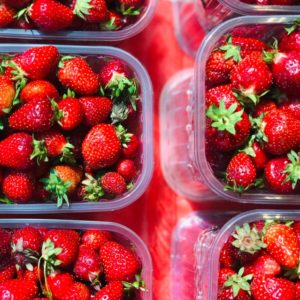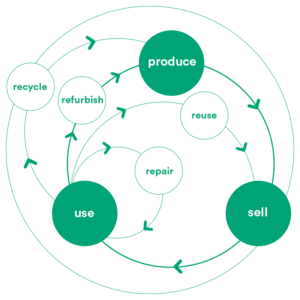45% of all material sent to landfill year-round in the US is from food waste and packaging, and during the Holiday season from Thanksgiving to New Year, waste generation increases by around 25%. That’s an additional one million pounds of trash going to landfill, much of it recyclable or completely avoidable.
As a business with one eye on the financial bottom line, this seasonal increase in waste may seem overwhelming or unavoidable, but no matter your sector, there are ways to reduce holiday waste for your business that can also spark change for the long term and keep profits flowing!
 Reduce Packaging and Reduce Waste
Reduce Packaging and Reduce Waste
As ecommerce picks up during the gift-giving season, we see a 30% increase in plastic waste. This number drives home the scale of the packaging problem in this country, but it also tells us that a switch away from plastic packaging would have an enormous impact. Whether you’re an e-businesses or a restaurant wrapping hot food, if you can cut out plastic from your supply chain in whole or in part, you are making a hugely positive move for the environment. But potentially for your profits too; one study has shown that for every $1 invested in waste reduction strategies restaurants could save $7.
Reduce Food Waste in Restaurants And Bars
Restaurants alone trash of over 11 billion tons of food each year, constituting an eye watering $25 billion cost to the industry. Like everything else, food waste swells during the holidays. But aside from using ingredients in a more efficient manner, what else can restaurants do?

Source: nytimes.com
There are organizations and waste management companies across the country poised to reclaim and distribute your food waste this holiday season (remember that reusing is preferable to recycling or composting as those processes still result in methane gas emissions).
The Food Rescue Locator is one option, and this national search engine set up in partnership with the EPA (Environmental Protection Agency) will help you locate an organization to get your unused food to those who need it most at Christmas and beyond. These food rescuers pick up unwanted foodstuffs from myriad sources (including farms, groceries, restaurants) and process it to be distributed to after school programs, food pantries and so on.
In addition to this, by cutting out the need for trash collection altogether, Metta, a restaurant in New York managed to save themselves about $300 a month. Though no mean feat for the average restaurant running tight margins, this kind of trailblazing move shows that profitability and zero-waste strategies are far from incompatible in the restaurant business.
Reduce Plastic Use at The Christmas Party
Less than 14% of the plastic produced globally is recycled each year. Instead, much of it will make its way to landfill where it takes decades to decompose, causing untold harm to the environment in the meantime.
Making wholesale changes to your supply chain is a worthwhile undertaking, but in this busy period over the holidays you might look for how and where to reduce plastic use today, and the easiest place to start is in your own workplace.
 Cut out disposable plastic crockery and single-use decorations from the office Christmas party (and day-to-day coffee routines). Think about where you order food and drink from too; check your suppliers’ packaging and how they deliver and clear up.
Cut out disposable plastic crockery and single-use decorations from the office Christmas party (and day-to-day coffee routines). Think about where you order food and drink from too; check your suppliers’ packaging and how they deliver and clear up.
For smaller businesses, a great way to make the annual celebrations more personal is to ask employees to bring in their own crockery. And if that’s a non-starter, biodegradable cups and plates are always preferable to single-use plastic.
Readily available Christmas decorations bought online or in store are often made of blends of materials like metal and plastic, which can be extremely difficult to tease apart for recycling—so, holding onto them year-on-year is important.
If you’re low on baubles to begin with, canvas your colleagues for their unused decorations, and between your staff, you’re almost guaranteed to fill a few boxes of spares and unwanted decorations. Beyond what you can glean second hand, there are elegant homemade solutions like branches, pine cones and dried fruit garlands that offer a beautiful counterpoint to the plastic sheen of commercial Christmas.

Source: shop.zerowaste.com
Promote Zero-Waste Gifts
If a Secret Santa gift pool is part of your office tradition, propose a novel approach this year in which zero-waste gifts are the goal. From homemade crafts to thrift-store-only shopping rules, there are a bunch of thoughtful alternatives to adding to the ecommerce craze. Or, as an employer thanking your employees for their hard work, consider giving them an experience as a team rather than a random gift that might not stand the test of time.
 Turn Off the Lights
Turn Off the Lights
Every year in the US, Christmas lights churn through enough electricity to power 14 million refrigerators, or the equivalent level of power El Salvador goes through in a year. So, although it’s tempting to let the Christmas cheer blaze all night with tree lights and elaborate window displays to bring in customers or cheer your employees, turning off the power before clocking off is a simple, core step to reducing waste over the holidays.

Source: rts.com
Make a Reuse and Recycle Resolution
As the year comes to an end, take stock of all your waste streams, and consider getting advice on how best to reduce waste and recycle in the new year. Whether you are a food services business with a high street location, an ecommerce business, or offer B2B services, broadening the kinds of materials that you can recycle is a big step toward reducing waste sent to landfill.
Although the holidays are undoubtedly the most wasteful time of year in America, we’ve seen that big problems can be met with big solutions, like reducing plastic use. Many of the suggestions here translate into long-term strategies to reduce waste and constitute the first steps towards Extended Producer Responsibility. Trying just a few of them today could have huge benefits for the planet and your business tomorrow.
For more resources and information on reducing waste visit the RTS blog, and to book a free assessment for your business, speak to our TRUE-Advisors today.

